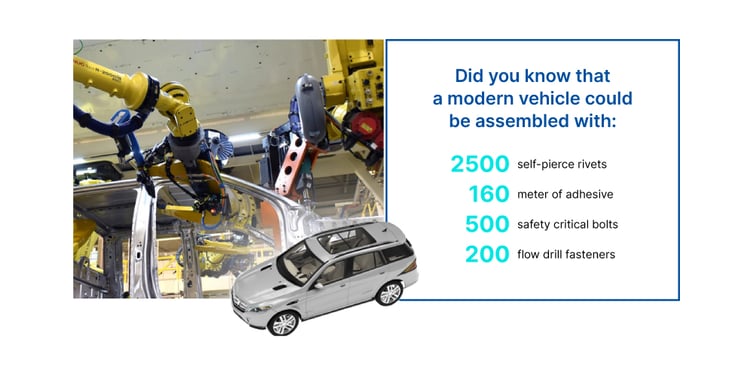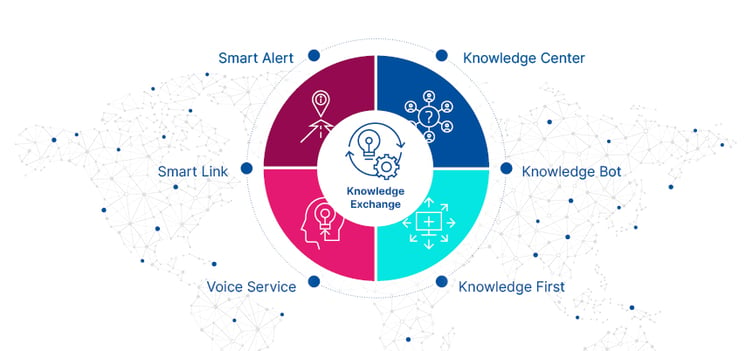The fundamental change in German industry is taking place through service: because more and more added value is being generated by data-driven services. New business models must be thought up, developed and implemented for the next generation of industry services. In the process, qualification, organizational and technology obstacles must be overcome. Especially the latter are the focus of a project at Atlas Copco. The following paper describes how an AI-based service knowledge management system will automatically monitor production processes in the future, thereby proactively detecting production errors, minimizing downtime and generating added value.
Atlas Copco is partner for the Service Master research project
The Service Meister research project successfully won the innovation competition "Artificial Intelligence as a Driver for Economically Relevant Ecosystems of the German Federal Ministry of Economics and Energy (BMWi). A central approach of the project is to completely digitizing the full service lifecycle in technical service. In cooperation with industry and service partners, this service knowledge will be made available on a cross-company platform from 2022. The basis for this is provided by application modules that apply artificial intelligence (AI). These so-called AI building blocks are currently being developed in company-specific use cases based on concrete practical requirements. After a generalization of these application modules, the principles developed here will serve as the basis for a holistic service ecosystem that will be completely scalable. In the medium term, this will primarily strengthen the competitiveness of small and medium-sized industrial companies.
An ideal use case partner for the Service Master project is the Atlas Copco Group. The portfolio of the leading supplier of industrial productivity solutions includes air and gas compression equipment, generators, construction equipment, mining and tunneling equipment, industrial tools, assembly systems and vacuum technology. Atlas Copco operates in more than 180 countries with more than 45,000 employees.
In the field of technical services for industrial solutions, some of these business units can be grouped together as "Industrial Assembly Solutions". These include, for example, sub-areas such as adhesive dispensing, self-pierce riveting, flow-drill fasting and tightening, all of which play a central role in automotive manufacturing, as Fig. 1 shows.

Fig. 1 Examples of Atlas Copco Industrial Assembly Solutions in modern vehicle construction
Many of these applications are already running as data-driven services at Atlas Copco and thus can be adressed from the IoT perspective as "smart products". For complex applications, such as those that play a role at Industrial Assembly Solutions, the area of quality assessment is always critical to success.
The classic Failure Mode and Effect Analysis (FMEA), as it is a standard component of engineering education, can also be nowadays - given that data quality and process understanding are at hand- implemented as a Data-Driven Service in the Industry 4.0 cycle. Atlas Copco is working on such a case together with the USU Group in the Service Master research project.
AI-supported monitoring of bonding and joining processes
In the sub-area of adhesive dispensing (joining and adhesive applications), the initial aim is to consistently bring together the service and maintenance knowledge of industrial joining and adhesive applications that are available in heterogeneously distributed databases. The approach here is to compile and harmonize the various data sources and inventories to such an extent that in the future AI-based quality decisions can be made automatically in real-time. Due to very sensitive process data, the basic willingness of the customer to share data is a central requirement for such data-driven services that relate to optimization processes. Then it becomes possible to optimize critical KPIs such as downtime (up to 20% reduction), costs for rejects (up to 10% reduction) and other parameters such as faster error detection and better remote repair. In the automotive industry, where the implications of multiple production lines can add unplanned downtime to daily costs in the millions, AI-based optimization processes are extremely effective.
In a further step, this coherent knowledge area is mapped in an AI-based knowledge management system. This requires first of all an interface adaptation of Atlas Copco's own Data Collector (ACDC). In addition to harmonizing the various big data inventories, this will result, among other things, in the possibility of carrying out initial inspections via simple visualizations in data cockpits / dashboards. Afterwards, these interfaces, which have to be developed precisely to fit the requirements, allow the expansion into numerous AI-based tools and services of a knowledge management system (see Fig. 2).

Fig. 2 Knowledge Management System Knowledge Exchange of the USU Group.
It already contains best practices, service suggestions and active support modules. In a further step, a new data-driven service for quality assessment ("Work Item Health") will be set up on the basis of these company- and use case-specific adjustments. The central process steps of the gluing and joining applications have to be measured for accuracy during the actual work and application process using a wide range of data sources. The quality of the various data sources mentioned at the beginning, which are relevant, for example, to a specific adhesive application, are automatically checked in real-time. In concrete terms, this means that, in addition to the station-point KPIs already in use and, if applicable, the end-of-line tests disparate from them, new quality measurements will be possible on the meta-level, which will result from the interface connection of Atlas Copco's own Data Collector (ACDC) to the AI-based analysis tools.
Finally, the existing information cockpits / dashboards of the knowledge management system are adapted so that their output can be passed on to the service bots reporting current system statuses. In this way, the existing service and maintenance knowledge is prepared in a case-specific manner prior to a specific service assignment and thereby made available to the service technician working on the site. With such an interplay of different information across numerous integration levels, Atlas Copco is well prepared for the challenges of technical service in the age of industrial IoT and Industry 4.0. Fig. 3 shows the different proportions of data exchange and analysis for different Service 4.0 services in the Atlas Copco portfolio, ranging from services without a data-driven approach to services on demand and smart-to-cloud services.
Service 4.0: Precisely identifying the causes of errors
Extracting value-adding relationships from large bodies of data - that is the clear goal of AI-based analysis technologies, helping companies in the mechanical and plant engineering industry to identify smart services and new data-driven business models. The main aim is to prevent damage and downtime and to increase productivity and quality. The development of an AI-supported Service Knowledge Management system at Atlas Copco, as part of the Service Master research project, will enable production errors and deviations in the gluing and joining processes to be detected with high accuracy during operation. Previously rather disparate data sets can be now compiled consistently using novel approaches. In this way, technicians in the factories are automatically informed in the case of a specific service requirement, and a newly compiled solution set is assembled to them ( a so-called “solution container”),which can be regarded as an AI-based best practice solution based on all information known to date. The aim is to enable the AI modules to automatically detect error states, inconsistencies, downtimes, maintenance problems, etc., and also to access historical data from previous service calls. In this way, problem areas can be precisely determined with their causes and production-relevant implications. This creates real joint added value for customers and suppliers in the production and service process.
 This article was written in cooperation with Mr. Stephan Boch, Atlas Copco IAS GmbH.
This article was written in cooperation with Mr. Stephan Boch, Atlas Copco IAS GmbH.